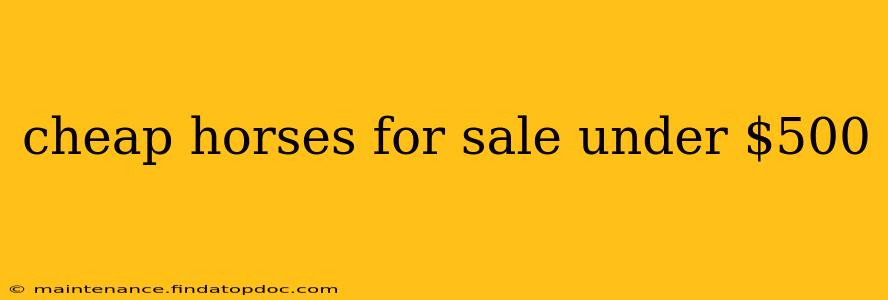Finding a horse for under $500 might seem like a dream come true, especially for aspiring equestrians on a budget. However, it's crucial to understand the realities of purchasing a horse at this price point. While it's possible, it requires realistic expectations, thorough vetting, and a willingness to invest time and effort. This guide will explore the challenges and opportunities of finding cheap horses for sale under $500, helping you make an informed decision.
What to Expect When Buying a Horse for Under $500
The low price tag often reflects the horse's condition, age, training level, or a combination of factors. You're unlikely to find a healthy, well-trained, young horse at this price. Instead, expect:
- Older horses: Many horses available at this price are senior citizens nearing the end of their riding careers. Their health may require ongoing care and medication.
- Horses with health or behavioral issues: Pre-existing conditions, lameness, or behavioral problems can significantly impact a horse's value. These issues might require expensive veterinary care.
- Untrained or minimally trained horses: Expect to invest significant time and potentially money in training. A horse lacking basic training can be challenging and potentially dangerous for inexperienced riders.
- Potential for hidden problems: Thorough vetting is paramount, as hidden health issues can lead to substantial unexpected expenses.
Where to Find Cheap Horses for Sale Under $500?
Finding affordable horses requires exploring various avenues:
- Online classifieds: Sites like Craigslist and Facebook Marketplace often list horses for sale at lower prices. However, exercise caution and verify information independently.
- Local auction sales: While risky, auctions can offer surprisingly affordable horses, but buyer beware! Thorough inspection is crucial. You might also find smaller, local sales held on farms or ranches.
- Rescue organizations: While not always under $500, reputable horse rescues often have horses needing homes. Adoption fees are usually significantly lower than market value, and you are often helping an animal in need.
- Word-of-mouth: Network with local equestrians; someone might know of a horse needing a new home.
What are the Risks of Buying a Very Cheap Horse?
The biggest risk is the potential for unforeseen veterinary expenses. A horse bought for $500 might require thousands of dollars in vet bills soon after purchase due to underlying health conditions. Other risks include:
- Behavioral problems: Difficult-to-handle horses can be dangerous and expensive to train.
- Lack of proper documentation: A lack of veterinary records makes assessing the horse's health history very difficult.
- Legal issues: Ensure the seller has clear ownership of the horse and you are not engaging in any illegal activity (e.g., purchasing a stolen horse).
How Can I Minimize the Risks?
- Thorough veterinary examination: This is non-negotiable. A pre-purchase vet check can reveal hidden health problems and save you from significant financial burdens later.
- Experienced handler: Bring someone knowledgeable about horses to evaluate the horse’s temperament and potential issues.
- Trial period: If possible, negotiate a trial period to assess the horse's suitability before committing fully.
- Realistic expectations: Remember, you're getting what you pay for. Don't expect perfection at this price point.
- Budget for unexpected expenses: Set aside a contingency fund for potential veterinary bills, farrier costs, and other unforeseen expenses.
What are the hidden costs involved in horse ownership?
Beyond the initial purchase price, owning a horse incurs significant ongoing costs:
- Veterinary care: Routine checkups, vaccinations, and potential treatments for illness or injury.
- Farrier services: Regular hoof trimming and shoeing.
- Feed and hay: A horse needs consistent high-quality feed.
- Boarding or pasture: Unless you have your own land, you'll need to pay for boarding or pasture space.
- Tack and equipment: Saddles, bridles, and other riding gear.
Is it worth it to buy a horse for under $500?
This depends entirely on your experience level, financial resources, and expectations. If you're an experienced horse owner with a reasonable understanding of potential risks and the ability to handle unexpected veterinary expenses, then it might be a worthwhile undertaking. For novice horse owners with limited resources, it is generally advised against. Prioritize finding a horse that suits your experience level and financial capabilities over solely focusing on price.
This article provides general information and does not constitute professional advice. Always consult with experienced equestrians and veterinary professionals before making any decisions regarding horse ownership.
